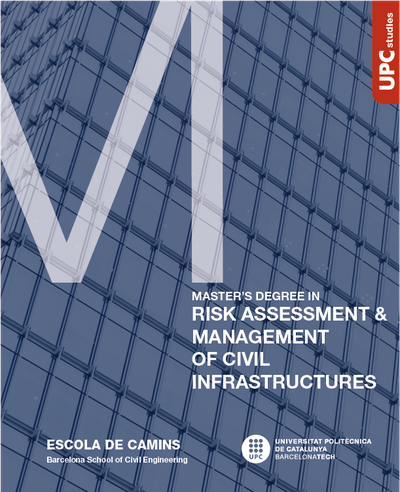Risk Assessment & Management of Civil Infrastructures (NoRISK)
Erasmus Mundus Master's in Risk Assessment and Management of Civil Infrastructures – NORISK is a one-year program consisting of 60 ECTS credits. It will be delivered by a consortium of four partners: University of Minho (PT), Universitat Politècnica de Catalunya (ES), Université de La Rochelle (FR), and Università di Padova (IT), supported by a committed group of 43 associated higher education institutions, industrial companies, NGOs, research and development institutions, and associations providing effective global links with the industrial sector and international relevance to the EMJM.
NORISK EMJM is a prestigious Erasmus Mundus Joint Master's Degree designed to address the critical need for professionals with a solid background in risk assessment and management within the context of civil infrastructures. This program stands out for its highly specialized curriculum and multidisciplinary approach.

Academic year starts in
September
Duration
1 year
Study load
60 ECTS (including Master's Final Thesis)
Delivery
On-campus
Language
English
Places
20
Official degree
Erasmus Mundus Master's in Risk Assessment and Management of Civil Infrastructures – NORISK / Màster Erasmus Mundus en Avaluació i Gestió de Riscos en Infraestructures Civils – NORISK by Universitat Politècnica de Catalunya
Participating universities
Fees
More information about fees and payment methods
More information about grants and loans
EU scholarships
Check the master's coordinator page for more information about the available EU scholarships
Academic coordinator
Admission to NORISK is based on competency; students will be evaluated based on their previous academic record. To be admitted, applicants must:
- Have completed at least 240 ECTS in Civil Engineering, Industrial and/or Systems Engineering, Materials Engineering, Environmental Engineering, or related fields, and hold a recognized degree in any of these fields. For students who have a study period at UNIPD (either through courses or dissertation), a minimum of 300 ECTS in Civil Engineering, Industrial and/or Systems Engineering, Materials Engineering, Environmental Engineering, or related fields, and a recognized degree is required. The Consortium views this broad spectrum of prior education as an advantage of the Master's program, offering students opportunities for collaboration across specialties.
- Have a good command of English. Non-native English-speaking students must have passed one of the following tests: TOEFL (score of 525 – paper-based / 72 – internet-based or higher) or IELTS (score of 6.5 or higher) or equivalent qualifications.
- Students who have not yet completed their degree but expect to graduate before September 21 may apply for the Master's course and receive a scholarship. If selected, their admission will be conditional upon receipt of the degree certificate from the Master's Secretariat by July 31 (EM scholarships) and September 21 (other applicants).
When applying, students must provide:
- Motivation letter between 1500 and 5000 characters (including spaces)
- Detailed Curriculum Vitae in European format (https://europa.eu/europass/en/create-europass-cv)
- Certificates and diplomas from previous university studies
- Academic transcripts including grades and course syllabi from previous university studies
- English proficiency certificates
- Certificates of relevant work experience and other professional certificates, if applicable
- Two letters of recommendation (sent directly by the applicant through the application portal)
- Proof of residency (issued within the last 12 months prior to the application deadline) – only for the first call
- Accredited special educational needs by a specialist doctor's report and/or, in specific cases, describing the type of special educational need and its impact on the requirements of the NORISK partner environment.
Admission is subject to approval by the NORISK Board of Directors and is based on the applicant's capacity and motivation, recommendation letters, and language skills.
NORISK EMJM will equip students with advanced knowledge and skills to work and develop a professional career in risk assessment, management, reliability and risk analysis, monitoring, digitalization, and intervention in civil infrastructures, especially those supporting human activities and/or considered critical, such as those connected to the energy, transportation, communications, water, health, defense and national security, banking and finance sectors, among others. In fact, risk assessment combined with concepts like reliability, robustness, resilience, and sustainability, is crucial for optimized asset management, being transversal to all these infrastructures/sectors.
NORISK will exploit common denominators that exist in all these sectors by addressing risk assessment towards better management. Therefore, the EMJM addresses the following key areas in civil infrastructure management, which are not adequately addressed in the general curricula of traditional Bachelor's and Master's programs:
- Risk assessment and management
- Reliability and resilience
- Management tools and decision-making
- Monitoring and digitalization
- Assessment and intervention
NORISK will provide a unique combination of theoretical work with an interdisciplinary focus, supported in risk assessment and infrastructure management, based on the cutting-edge knowledge of European universities, with effective cooperation between civil, industrial, and systems engineers in a common educational project, during which special attention and time are devoted to project-based learning.
The structure of the NORISK program consists of two semesters: in the 1st semester, from October to March, the teaching part takes place, which consists of five sequential units (NR1 to NR5) and a project-based learning unit (NR6), while in the 2nd semester, from March to July, the student develops their Master's thesis.
Related links
Share: